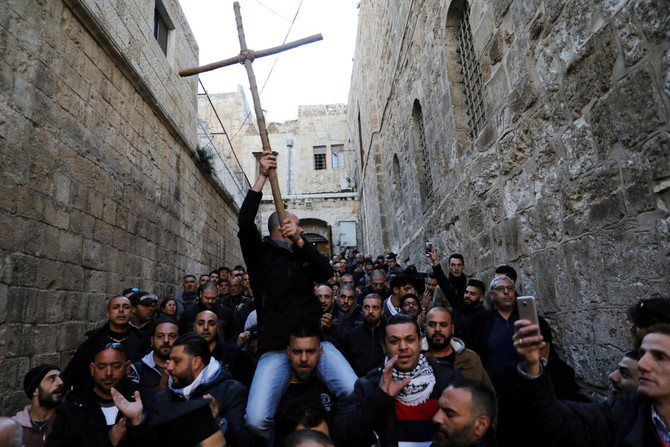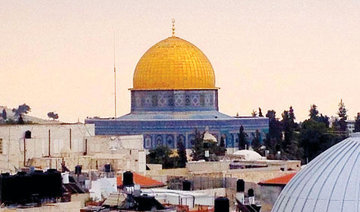JERUSALEM: Jerusalem’s Church of the Holy Sepulchre, revered as the site of Jesus’s crucifixion and burial, reopened on Wednesday after Israel backtracked on Tuesday from a tax plan and draft property legislation that triggered a three-day protest.
The rare decision on Sunday by church leaders to close the ancient holy site, a favorite among tourists and pilgrims, with the busy Easter holiday approaching put extra pressure on Israel to re-evaluate and suspend the moves.
After receiving a statement from the office of Israeli Prime Minister Benjamin Netanyahu, Roman Catholic, Greek Orthodox and Armenian clergy announced on Tuesday the church would reopen the next morning.
Before dawn on Wednesday, Wajeeh Nusseibeh, who is charge of locking and unlocking the church, climbed a stepladder and turned the key to open its main wooden door.
“It’s one of the holiest sites for our religion and we prayed very hard these last three days that things would change and it would be open for us to be able to go in,” said an American pilgrim, who gave her name only as Laurie.
An Israeli committee led by cabinet minister Tzachi Hanegbi will negotiate with church representatives to try to resolve the dispute over plans to tax commercial properties owned by the church in Jerusalem, Netanyahu’s statement said.
Church leaders, in a joint statement, welcomed the dialogue.
“After the constructive intervention of the prime minister, the churches look forward to engage with Minister Hanegbi, and with all those who love Jerusalem to ensure that our holy city, where our Christian presence continues to face challenges, remains a place where the three monotheistic faiths (Judaism, Islam and Christianity) may live and thrive together.”
The Jerusalem Municipality, Netanyahu said, would suspend tax collection actions it had taken in recent weeks.
Mayor Nir Barkat has said the churches owed the city more than $180 million in property tax from their commercial holdings, adding that “houses of worship” would remain exempt.
While the review of the tax plan is under way, work on legislation that would allow Israel to expropriate land in Jerusalem that churches have sold to private real estate firms in recent years will also be suspended, Netanyahu said.
The bill’s declared aim is to protect homeowners against the possibility private companies will not extend their leases of land on which their residences stand.
Churches are major landowners in Jerusalem. They say such a law would make it harder for them to find buyers for their land- sales that help to cover operating costs of their religious institutions.
Jerusalem’s Church of Holy Sepulchre reopens after protest
Jerusalem’s Church of Holy Sepulchre reopens after protest

Jordanian king and Indonesian president to cooperate in stability efforts in Gaza

- Indonesian President Prabowo Subianto emphasized his country’s commitment to establishing an independent Palestinian state
- King Abdullah stressed the importance of dialogue to reduce tensions related to Iran and to support stability in Syria and Lebanon
LONDON: King Abdullah II and Indonesian President Prabowo Subianto discussed cooperation in an effort to restore stability in the Palestinian coastal enclave of Gaza.
The meeting on Wednesday at Basman Palace in Amman focused on regional issues, particularly the support for achieving peace based on the two-state solution, and the commitment to protecting Palestinians in Gaza, according to Petra news agency.
King Abdullah praised Indonesia’s political position and highlighted its investments in regional projects as essential to enhancing collaboration.
Subianto emphasized his country’s commitment to establishing an independent Palestinian state, achieving lasting peace in the region, and ending the conflict in Gaza.
The talks highlighted the ties between Jordan and Indonesia, spanning over 75 years, and the commitment to enhancing cooperation in politics, economics, defense, business, energy, science, technology, and health.
King Abdullah stressed the importance of dialogue to reduce tensions related to Iran and support the Syrian Arab Republic and Lebanon in maintaining their security, sovereignty, and stability, Petra added.
Several Jordanian officials attended the talk, including Crown Prince Hussein, Deputy Prime Minister and Foreign Minister Ayman Safadi, Chairman of the Joint Chiefs of Staff Maj. Gen. Yousef Huneiti, Director of the Office of His Majesty Alaa Batayneh, and Minister of Industry, Trade, and Supply, and Escort of Honour Yarub Qudah.














